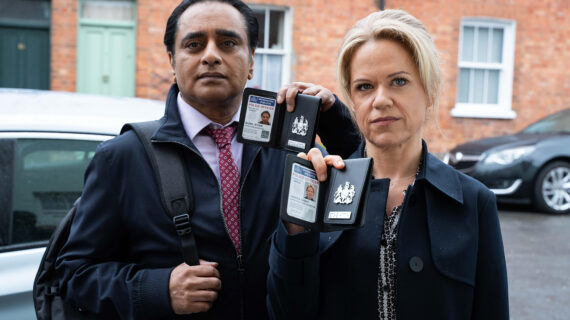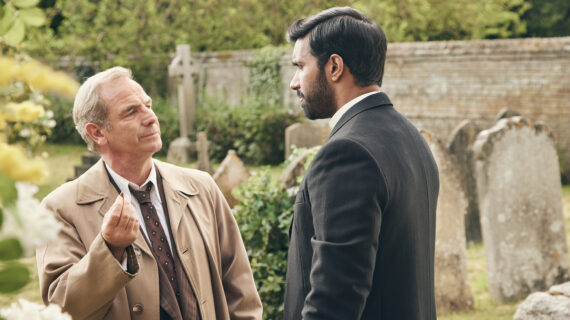Zac Schultz:
I’m Zac Schultz filling in for Frederica Freyberg. Tonight on “Here & Now,” the story of one Milwaukee family’s ongoing recovery from gun violence. We’ll hear from a city leader on how gun violence creates trauma for an entire community. This week, Governor Evers issued the first pardons in Wisconsin in nine years. I’ll talk with a member of the governor’s Pardon Advisory Board. And a look at the United States’ shifting alliance in the Middle East. It’s “Here & Now” for October 11.
Announcer:
Funding for “Here & Now” is provided, in part, by Friends of Wisconsin Public Television.
Zac Schultz:
Four people were shot in Milwaukee yesterday, two adults and two children. Police say one of the adults was killed. Unfortunately, this is not rare. Last year in Milwaukee, 100 people were victims of homicide. Another 475 were victims of nonfatal shootings. While murders draw more attention, the effects of a nonfatal shooting can be life-altering and ripple just as far into the community.
In August of 2018, Tyrese Mosbey was looking to start a new chapter in his life. He had enrolled in an alternative school hoping to catch up on his studies.
Tyrese Mosbey:
It was good. I did my work on time. I came to school on time.
Tamika Johnson:
Tyrese stood out.
Zac Schultz:
Tamika Johnson was his English teacher.
Tamika Johnson:
He wasn’t a follower. He was one of the ones in the classroom that when I gave an assignment, he finished it on time.
Zac Schultz:
On August 29, Tyrese finished his latest assignment. His academic goals for the year.
Tyrese Mosbey:
I will achieve and reach my goal by attending school on time, staying in my own lane and by staying out of trouble.
Zac Schultz:
That afternoon, there was a fight at school that spilled into the neighborhood. Uninvolved, Tyrese ended up at the bus stop down the block.
Tyrese Mosbey:
And then it was me and some other friends at the bus stop. And I guess the man came back and drew a pass. And he looked at me. And I looked at him. Then as I was about to run, you know, he got to shooting. He shot ten times. Only hit me once. I feel it. I felt it right here on my head. I fell to the ground on my left side.
Zac Schultz:
His teacher Tamika heard the shots and ran outside.
Tamika Johnson:
And we see a police officer giving CPR.
Tyrese Mosbey:
And I told him, I said, “Please just call — go tell me Mom I love her. I think I’m checking out.” I thought I was dying.
Latoya Curry:
The day I got the call —
Zac Schultz:
Tyrese’s mother, Latoya Curry, got the call at work.
Latoya Curry:
I’m crying happy tears and sad tears. But when I got that call, I didn’t — not one soul in my body, my body said my baby was gone.
Zac Schultz:
Tyrese was in a coma.
Tyrese Mosbey:
A coma, like, it’s a long, long nightmare.
Zac Schultz:
He came out of it, but remained hospitalized. Four months later, Tyrese survived brain surgery. But his left side was paralyzed and he couldn’t talk.
Tyrese Mosbey:
When I woke up the coma, I couldn’t really talk. Do nothing. I couldn’t even move my whole left side. I still can’t move my arm yet. But I couldn’t move my left leg. It’s still weak but I’m working on getting stronger to walk more independently.
Zac Schultz:
Tyrese was facing months of rehab. Suddenly his academic goals took on a new meaning.
Tyrese Mosbey:
I will lead myself in the right direction and push myself to do better.
Zac Schultz:
While Tyrese struggled in rehab, his mother struggled at home, taking care of her seven-year-old daughter and year-old son while visiting Tyrese and trying to keep her job.
Latoya Curry:
That’s what keep me strong, like, the kids. And then I’m like, “No, my baby always gonna be here. He ain’t going nowhere.” With all the bad news and the good news, I cry happy tears, sad tears.
Zac Schultz:
She moved out of her apartment, fearing more violence and ended up homeless.
Latoya Curry:
I’m not gonna to lie. It’s been like stressful and hard.
News Reporter:
Now his teacher is hoping the community steps up to help them.
Zac Schultz:
Tamika started a fundraiser.
Tamika Johnson:
What I notice in our community is when a person that we raise so much money for the funeral, but then when the children do survive, they’re by themselves.
Zac Schultz:
Tyrese spent most of his rehab an hour away from Milwaukee, so his mother could only see him once a week. Or when he had appointments in the city.
Tyrese Mosbey:
That’s perfect.
Zac Schultz:
Strangers who heard his story offered their prayers.
Woman:
We thank you for bringing Tyrese from a mighty, mighty long ways.
Tamika Johnson:
Once they’re shot, we pray. Let’s pray that they survive. And then when they do survive, they’re left by themselves.
Zac Schultz:
With new glasses in hands, it’s time to head back to rehab.
Latoya Curry:
Every time it happen, it make me wanna cry. Leave my baby. I be down, but it bring me up knowing that he’s not crying and, you know. So I feel better now. But I be just hate leaving him.
Zac Schultz:
Tyrese had to relearn skills he had mastered long ago. But he never gave up.
Tyrese Mosbey:
You never lose hope or faith. Even though my arm is not, you know, fully there yet, I haven’t gave up, because one day my arm might move.
Physical Therapist:
Good. Pick it up.
Zac Schultz:
His goal was to get home, to be a big brother to his brother and sister.
Tyrese Mosbey:
My mother, my two little siblings, my little brother and my little sister. That’s — they my heart.
Latoya Curry:
Look at him. Look at him. He — he getting up, y’all.
Zac Schultz:
Ten months after he was shot, Tyrese was home.
Latoya Curry:
It is like a blessing for him to be home. Sometimes I wake up and I just go in the room and you know he be talking to me. Dang, momma keep coming up here. Momma keep coming up here. That’s my — he’s 18 now and still my baby.
Tyrese Mosbey:
I feel good to be at the crib with my family.
Zac Schultz:
It’s happy. But it can’t be a happy ending. Because Tyrese and his family will deal with the impact of his shooting for the rest of their lives.
Latoya Curry:
Some people say it’s hard, like, with a child like this, he’s still a blessing.
Tamika Johnson:
I think he is a pure example of hope and he’s also an example of what gun violence does to a community, to a family, to a school.
Latoya Curry:
It’s too much. And then they be out here shooting. You don’t know who you shooting at? That’s not even the person. Y’all shooting at the wrong person.
Tamika Johnson:
It’s emotionally draining, it is. How many Tyreses do we have in Milwaukee?
Zac Schultz:
The impact of gun violence does not stop with Tyrese or his family. Friends, classmates and teachers all carry that trauma with them. Joining us now is Reggie Moore, who runs the Office of Violence Prevention through the city of Milwaukee’s Health Department. Thanks for your time today.
Reggie Moore:
Thank you.
Zac Schultz:
Reggie, what’s your reaction to Tyrese’s story?
Reggie Moore:
I mean, the first thing I want to acknowledge – one – is his resilience and his recovery and just how proud I am of him. I know that his teacher reached out to the Office of Violence Prevention last year. So this is something that we’ve been following. But also I want to underscore the fact that in Milwaukee over 500 people are shot every year. And unfortunately I think the story underscores the fact that this population often goes invisible. We pay attention to the number of homicides. I think the community rallies around those families, as they should. But I also think that we neglect to understand and appreciate the gravity of the amount of people who are suffering and surviving after being shot in the city.
Zac Schultz:
What’s the impact on classmates of Tyrese when they see him shot outside the school and then have to carry on the next day?
Reggie Moore:
And I can speak to that from personal experience, both in my own life, but also in my work with young people throughout our community. It’s significantly traumatic. It is hard to obviously concentrate or focus or be able to move on after something has happened to somebody you care about. That’s why it’s critically important, and I think it was highlighted in this story, how important educators and folks who have direct and trusted relationships with young people are in that healing process.
Zac Schultz:
Now, we just had another episode of gun violence in Milwaukee. Is that reoccurring trauma going to affect the people that knew Tyrese a year ago? Everyone who suffered, do they suffer again when they hear of another episode?
Reggie Moore:
Every time these things happen, it not only affects the people directly impacted, but it affects the entire community. There’s been a series of shootings over the past two weeks. There’s been increasing incidence of women and girls should have been shot. This is something that definitely shocks the entire system of our community. People are working every day trying to prevent it on the front end and support and provide healing on the back end. This is something that we have to take seriously because the trauma that’s not transformed often gets transferred. So when you look at decades of pain in this community of young people who grow into adults, who carry a lot of pain, that may eventually or could result in rage, it is something that we have to do to really stop the production of trauma, both from a systemic level, when we look at concentrated poverty, mass incarceration, etc. but also on an interpersonal level. It’s critically important when we talk about healing, when we talk about community resilience, what that means on the ground level. It’s really about neighbor to neighbor, family to family, friend to friend and being really committed to being here for each other and not — the silence can be deafening. If somebody gets shot in a community or neighborhood or even in a school and there’s no outrage, there’s no response, there’s no outreach following that, it becomes normalized. We can never normalize this level of violence and trauma in any community.
Zac Schultz:
Now besides the Office of Violence Prevention, you’re also involved with a group call Scaling Wellness In Milwaukee, or SWIM. What are these two organizations doing to promote healing?
Reggie Moore:
Right. We have a trauma response partnership that we work with, in terms of first responders as well as the Milwaukee County Behavioral Health Division. This is something that has been going on since 2015 where we’ve trained first responders to understand trauma and the importance of ensuring that children who have been exposed to violence get immediate and consistent support and counseling as needed. And so that’s something that we continuously do. We’re at over 200 referrals for this year alone. In partnership with SWIM, we’re looking at how do we improve the coordination of crisis response in Milwaukee. When a critical incident happens, how do we ensure that we’re working collectively as a community to address the aftermath of trauma? But most importantly, how do we build community capacity to prevent trauma in the first place?
Zac Schultz:
We talk about the city of Milwaukee, but isn’t the trauma different and deeper when we’re talking about communities of color within Milwaukee?
Reggie Moore:
I think you have incidents of concentrated trauma. And again, not to pathologize a community but we also have to understand the historical context. We didn’t get here overnight. There were policies and there were practices and things that have happened that have created conditions where poverty and trauma thrive. So we have to undo that. It’s going to take time to undo that. But while we do that, we also have to be cognizant of triaging the trauma that’s happening in our cities every day and every night. But this is going to take an all hands on deck effort from policymakers, philanthropy to business community and everyday residents who are all cognizant of understanding how we got here and all of the effort that it’s going to take to transform this community. When we look at equitable investment and prevention, we have not done that. What we’re suffering from right now is the lack of investment and prevention over the past two to three decades in this community. Milwaukee is not alone in the affect. We have over-relied on the criminal justice system to solve critical, historical and systematic issues that they’re not — basically punishing people for the pain that they’ve suffered and endured. So again we have to have a paradigm shift in how, as a community, we build a community that can thrive and not constantly reacting to trauma on the back end.
Zac Schultz:
You mentioned normalizing this trauma. Is it difficult to get people to acknowledge that they’re even affected by trauma in the first place?
Reggie Moore:
That’s a good question. I think it’s important to understand that every adverse event doesn’t necessarily result in trauma. When I took the ACEs survey, for example, I scored pretty high. So my exposure as an African-American man in this community and the things that I experienced and were exposed to were quite a few in terms of adverse experiences. Some of those were more traumatic than others. What’s important is that people are self-aware and recognize, and obviously when it comes to children, that parents are aware and recognize the effects of PTSD, the effects of trauma and understanding that, yes, prayer works. There are other traditional practices that different faith communities or individuals may engage in. But also destigmatizing mental health. There’s nothing wrong with seeking professional counseling or talking to somebody about how you’re feeling or when it comes to your child to say, you know what my child is waking up two, three times a night screaming as a result of their exposure to seeing their friends shot maybe two months ago or a year ago or three years ago. That is absolutely okay not to be okay, meaning it is okay to seek help. Unfortunately we have stigmatized what we call mental health or mental illness and understanding that all of us struggle with one thing or another. And that it’s not human nature to be exposed to something that is traumatic and that level of evil and feel like you can continue to go on without any level of support. So I just want to encourage our community and every community to take mental health seriously.
Zac Schultz:
Reggie Moore from Milwaukee, thank you for your time today.
Reggie Moore:
Thank you.
Zac Schultz:
Now to State Capitol news. Earlier this week, Governor Tony Evers issued the first pardons of his time in office and the first in Wisconsin in nine years, since former Governor Scott Walker disbanded the Pardon Advisory Board and refused to issue any at all. Joining us now is Noble Wray, a member of Governor Evers’ Pardon Advisory Board. Thanks for your time today.
Noble Wray:
Thank you.
Zac Schultz:
First off, let’s explain what a pardon is and is not in Wisconsin because it doesn’t erase the existence of a crime, correct?
Noble Wray:
No, it does not but it is — it comes from the word, sometimes used is “clemency.” It is a governor giving someone relief of their sentence. So that is erased. It is something that people explore to get erased. It is really important. It is something that people work for.
Zac Schultz:
Now, the Pardon Advisory Board received more than 200 requests off the top of Governor Evers being elected. What were you looking at in going through those applications?
Noble Wray:
We’re looking at a number of things. Governor Evers has laid out a very balanced approach and that is looking at the person’s crime that they committed, the level of seriousness. Looking at obviously they’ve completed it in a period of time that has gone by, roughly five or more years that we’re looking at. Along with that, what they have done in that period of time. You know, are they connected back in society? Are they going to school? What are they contributing? How are things going in their lives in general, which is really important. We also look at something that’s also important and key here, is we can’t forget the victim that was involved in some of these crimes that have been committed. So all of those things are considered when the advisory board is meeting and deliberating what recommendations we’re going to provide to the governor.
Zac Schultz:
In a statement, the governor used the term “forgiveness.” Does that mean that those who don’t receive a pardon are not forgiven? How does that word apply?
Noble Wray:
It’s really important. In the state of Wisconsin, I’m personally glad that the governor sought this out, to reinstitute the pardon board. This idea of redemption, that someone gets a second chance. It’s very important. I think it creates an environment where people that have had a — made a mistake in their life, that they know that if they get back, they get connected, they do a period of time where they’re not criminally involved. They’re providing for their family and friends and really engaging back into society, that they get a second chance. And that’s really important, and it’s important to the people that apply.
Zac Schultz:
Now, governors usually issue most of their pardons near the end of their time in office. Is there a political danger or risk in pardoning someone because if they reoffend then that implies something about the governor or the choice in the first place?
Noble Wray:
There’s always a possibility that something like that could happen. But I think that Governor Evers has really laid out some nice steps in there, some nice considerations. And that is, again, that period of time, how connected are they, what are they doing with their lives? Are they going to school? Are they going to work? All of those things are certain indications that this person has adjusted back properly into society.
Zac Schultz:
One of the bigger questions that came up in Governor Evers’ election was about drug crimes or things that we would look at differently today than we did when someone was sentenced. Is that something you’re taking under advisement?
Noble Wray:
All of those things are taken under advisement. The evolution of what happens with laws and changes of laws have really changed. At the federal level in terms of how they look at crack cocaine and cocaine base that has changed. Obviously where we were 10 to 15 years ago in this country with marijuana, you see that evolution that has changed. So I think it’s important and that’s what we’re trying to do, is to be responsive to the times, as well as, you know, we may have overshot what we did with that whole drug war. This is an opportunity to take a second look at that.
Zac Schultz:
Some of our viewers may remember that you were the chief of police for the Madison Police Department. How does your law enforcement background come into your choices on this Pardon Advisory Board?
Noble Wray:
I think it adds to the richness of our deliberation. There’s a nice mix, a diverse mix of people that are on the board that bring different insights. Everything from, you know, judges to, you know, people of faith talking about restorative justice, talking about the issues of victims in this whole thing. The balance of ensuring that we’re making sure that the people that are given pardons, that, you know, you know, safety and public safety is still an issue. So it is a very nice mix.
Zac Schultz:
Noble Wray, thank you for your time today.
Noble Wray:
Thank you.
Zac Schultz:
Turning now to international news, the United States is watching as an army from Turkey is attacking our allies, the Kurds. To help us understand why and what if anything our Congressional delegation can do about it, we’re joined by Andrew Kydd, professor of political science at the University of Wisconsin. Welcome. Thanks for being here.
Andrew Kydd:
Thanks for having me.
Zac Schultz:
As of last week the Kurds were our allies in the Middle East and Syrian and were guarding the remnants of ISIS. What geo-political sense does it make for us to back off and let them be bombed by Turkey?
Andrew Kydd:
Well, a lot of people are critical of that move and think it doesn’t make much geo-political sense. The rationale from the Trump administration has been that the president wants to get American troops out of the Middle East in general. He thinks our involvement in the Middle East has been a mistake. So he has wanted over the years ever since he started in office to withdraw U.S. forces from the region and in particular from Syria, which he threatened to do back in December of last year and now has gone ahead with in the past couple days.
Zac Schultz:
Traditionally, Congress plays a role in acts of war and we’ve heard denunciations from Democrats, a lot of silence from Republicans. I should say Green Bay Republican Congressman Mike Gallagher wrote on Twitter that this does undermine our credibility in the region. But what role does Congress have to play? They can — can they stop him from doing anything like this?
Andrew Kydd:
They probably can’t stop him from doing it. What they’re trying to do at this point is to pass a bill, a resolution at least, imposing sanctions on Turkey for doing this and try to confront the president with his choice of vetoing a bill that would probably get bipartisan support in the Senate, including from Republicans, or not. And if he were to sign it, then the United States would be imposing sanctions on Turkey for doing something that President Trump had given them the green light to do, mainly to invade northern Syria. So that would pose a bit of a dilemma for the president.
Zac Schultz:
What are the long-term consequences of abandoning an ally like the Kurds?
Andrew Kydd:
A lot of people are worried that this will undermine American credibility, not just in the Middle East, in Syria, but around the world in other circumstances as well if the United States can just, as a result of a phone call with a particular leader, reverse years of policy in this case. We’ve been supporting this particular Kurdish group very intensively ever since 2015 in the struggle against the Islamic State. But if we can just spin on a dime and abandon anyone who has fought with us, lost tens of thousands of lives in a cause that we shared with them, that’s creating worries in other countries as well. Other allies who depend on us such as Israel, Taiwan, to some extent, South Korea are going to look at that and be really scared in some sense by the inconstancy of American policy. I think that’s what a lot of people are worried about.
Zac Schultz:
Isn’t that to be expected in a democracy where we change parties and leaders that quickly, every four years or perhaps sooner thru impeachment? Could this shift again if there’s a new leader in the White House, change how we’re interacting with these allies? Can we get these relationships back?
Andrew Kydd:
We could. There’s a good old saying that it takes a long time to build trust and it can be destroyed in a moment. So it may prove more difficult to restore that trust if it is damaged through these incidents. And other countries I think will have to look at the United States from now on and wonder what is the sort of range of American policy going to be. Previously, I mean you can exaggerate it but there was a certain consensus about certain commitments on the part of the United States. Certainly to our NATO allies, to Israel, to South Korea, and the president has been really questioning those commitments and complaining that the Europeans are free riding off of us. The same with the South Koreans and the Japanese. And generally seems to have a pretty strong anti-alliance point of view. If that’s going to be become dominant in the Republican Party, that’s going to be a big, big shift.
Zac Schultz:
We’ll have to leave it there. Andrew Kydd, thank you for your time today.
Andrew Kydd:
My pleasure. Thanks.
Zac Schultz:
Now for an update on stories we’ve been covering over the past few weeks and months. It took ten months, but the Republican-controlled State Senate confirmed the first of Governor Evers’ cabinet members this week. The first five confirmed secretaries include Revenue Secretary Peter Barca, Financial Institutions Secretary Kathy Blumenfeld, Administration Secretary Joel Brennan, Corrections Secretary Kevin Carr and Veteran Affairs Secretary Mary Kolar. The Senate has yet to confirm 11 of Evers’ designees. In other state news, a report from the Department of Natural Resources found high levels of unsafe chemicals known as PFAS in Madison’s Starkweather Creek. The highest levels reached 13 times the recommended standard. One known source of the chemicals are firefighting foams used on the Truax Field National Guard Airbase near the creek. The DNR is working with local partners to take action against the contamination. Speaking of Truax Field, the State Senate passed a resolution in support of bringing new F-35 fighter jets to Madison. Some Democratic lawmakers have raised concerns about the impact of the jet’s noise on the local community. Others believe the jets are an economic asset to Madison. Finally tonight, a look ahead to next week, when Marisa Wojcik reports from a northwest Wisconsin community at odds over the prospect of a new neighbor: a proposed 26,000-head hog farm. What some see as promising economic growth for the area, others see as a potential polluter. I’m Zac Schultz. Have a great weekend.
Announcer:
Funding for “Here & Now” is provided, in part, by Friends of Wisconsin Public Television.
Search Episodes
Related Stories from PBS Wisconsin's Blog

Donate to sign up. Activate and sign in to Passport. It's that easy to help PBS Wisconsin serve your community through media that educates, inspires, and entertains.
Make your membership gift today
Only for new users: Activate Passport using your code or email address
Already a member?
Look up my account
Need some help? Go to FAQ or visit PBS Passport Help
Need help accessing PBS Wisconsin anywhere?

Online Access | Platform & Device Access | Cable or Satellite Access | Over-The-Air Access
Visit Access Guide
Need help accessing PBS Wisconsin anywhere?

Visit Our
Live TV Access Guide
Online AccessPlatform & Device Access
Cable or Satellite Access
Over-The-Air Access
Visit Access Guide
 Passport
Passport

















Follow Us